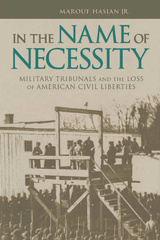Our shopping cart is currently down. To place an order, please contact our distributor, UTP Distribution, directly at utpbooks@utpress.utoronto.ca.
Popular Trials
Rhetoric, Mass Media, and the Law
Contemporary scholarship illustrates the law’s increasingly powerful role in American life; legal education, in turn, has focused on the problems and techniques of communication. This book addresses these interests through critical study of eight popular trials: the 17th-century trial of Dr. Henry Sacheverell, and the 20th-century trials of Scopes, the Rosenbergs, the Chicago Seven, the Catonsville Nine, John Hinckley, Claus von Bulow, and San Diego Mayor Larry Hedgecock. Such trials spark major public debates, become symbols of public life, and legitimize particular beliefs and institutions. Despite high visibility and drama, however, the popular trial has not received sufficient study as persuasive event. Lying at the intersection of the institutional practices of law and the mass media, the popular trial has confounded study according to the conventional assumptions of scholarship in both law and communication studies.
An excellent treatment of the criminal trial as a media forum that mediates social issues to the masses.'
—CHOICE
This book explains . . . How some trials have managed to acquire an importance, both to contemporaries and in history, that far outstrips their limited legal signiÞcance.'
—The Journal of American History
An original, and valuable, contribution to our understanding of the rhetoric of mediated public discourse. . . .The essays are well researched, well argued, and well written.’ – Stephen A. Smith, University of Arkansas
Robert Hariman is Associate Professor of Speech Communication at Drake University.






